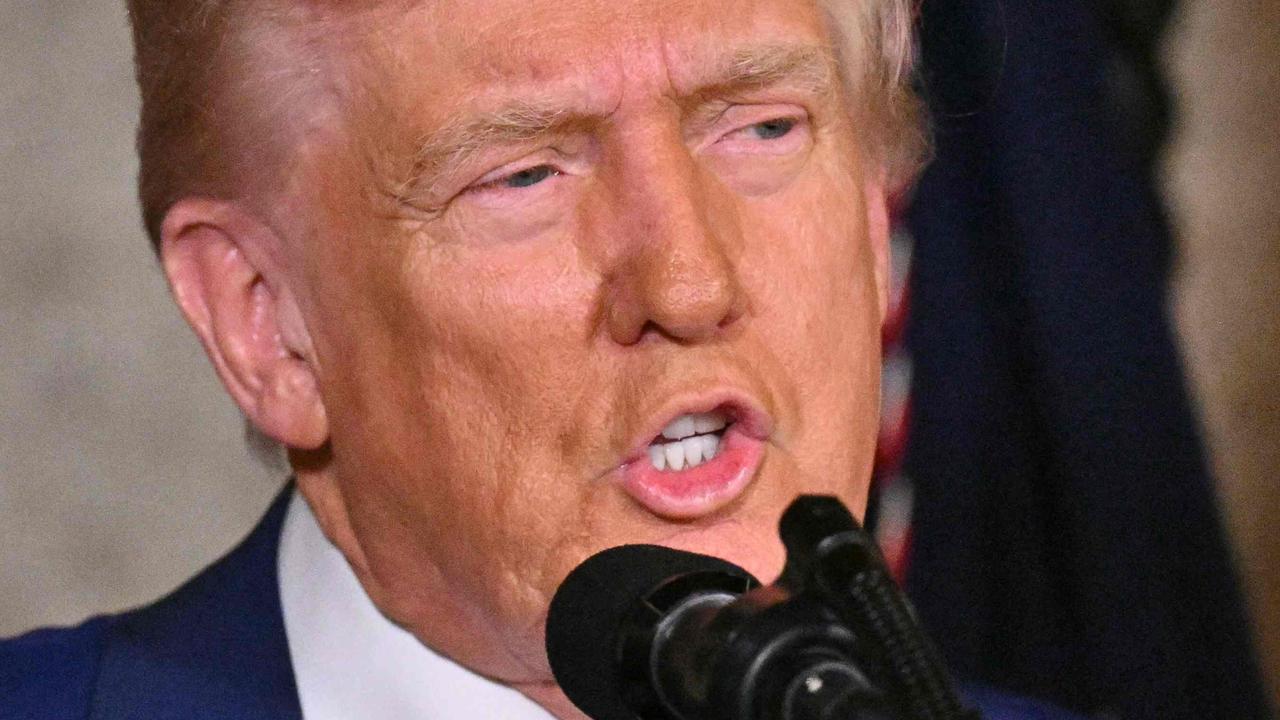‘Increasingly unstable’: Expert claims Trump win would be ‘calamitous’ for Aussie economy
Australia’s economy is on the brink of disaster, with a Trump victory paving the way for a trade war no Aussie can ignore, some experts have warned.
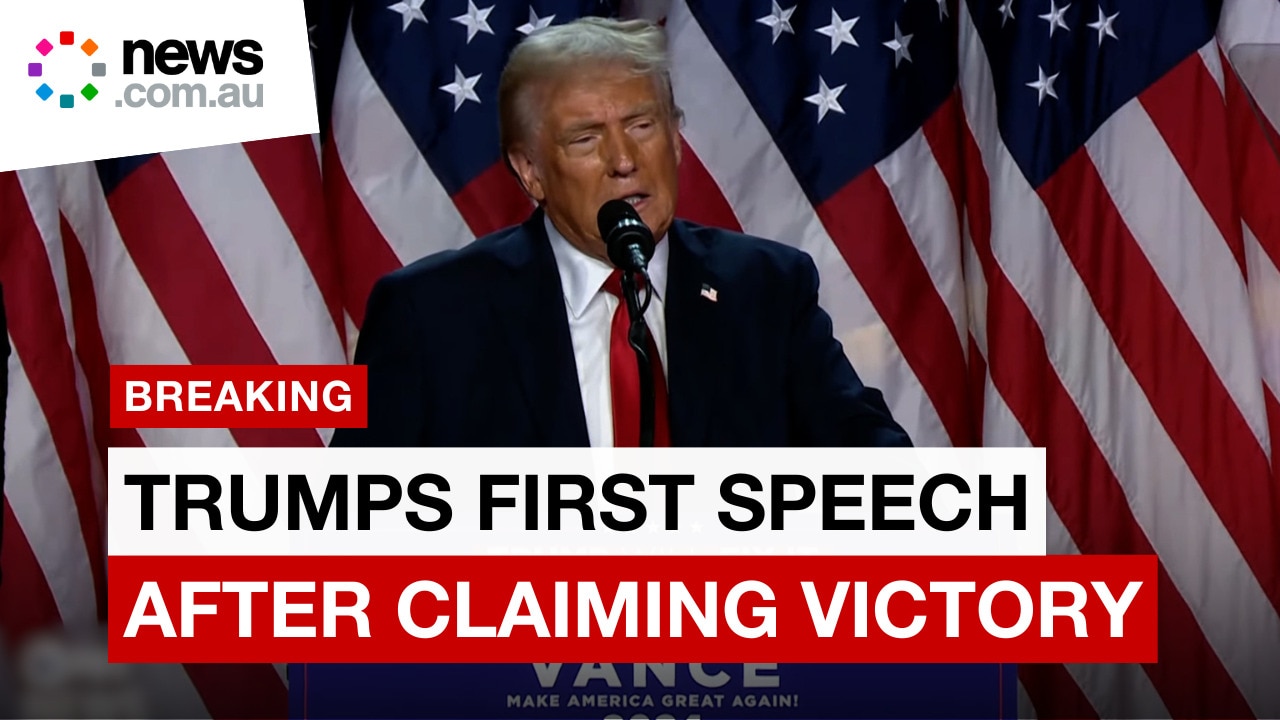
World
Don't miss out on the headlines from World. Followed categories will be added to My News.
ANALYSIS
Australia’s economy faces tempestuous times ahead – thanks to divisive policies embraced by both US presidential candidates, Donald Trump and Kamala Harris.
America’s tumultuous political environment has kept the 2024 campaign firmly focused on domestic issues. Jobs. Cost of living. Foreigners.
Neither candidate has outlined a clear plan for dealing with the increasingly unstable global strategic and economic circumstances.
Unless it has a direct impact on voter turnout, that is.
Donald Trump has promised to impose an “across the board” 10-20 per cent tariff on all imports. For China, that tariff will be 60 per cent.
As of 5.50pm AEDT, Mr Trump is projected to win the election and become the next US president.
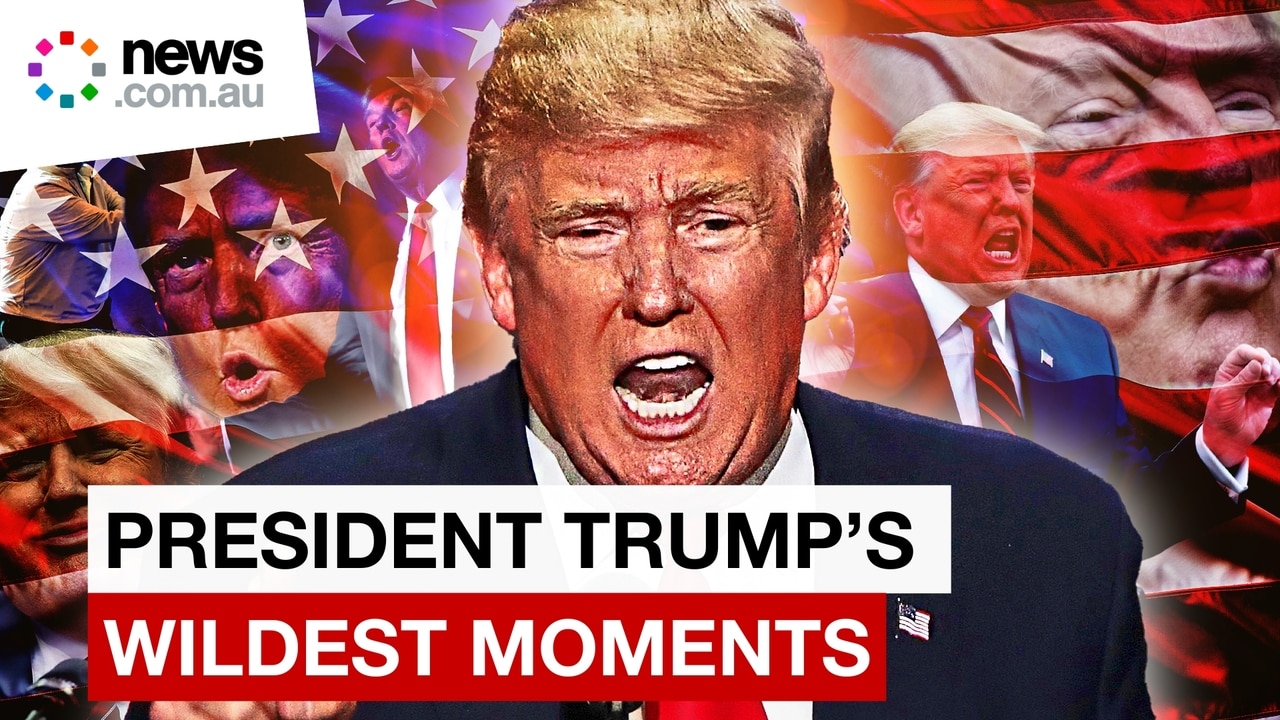
And it will have a huge impact on Australia – and our biggest commodity exports.
In fact, Matthew Durban, a former senior economist and trade commissioner at the Australian Trade and Investment Commission, told Nikkei Asia that a Trump win would be “calamitous” for the Aussie economy, while renowned economist Shane Oliver said we could be on the cusp of a “global trade war”.
“China is our biggest export market, takes 35 per cent of our exports, if it’s subject to tariffs then it could be a dislocation effect, where there’s a flow back to less demand for our products that feed into the Chinese industrial or production process,” Dr Oliver said.
“If Trump’s tariffs ignite a global trade war, which leads to a sharper downturn in global economic activity, that’s probably the biggest risk.”
Australia’s Treasury secretary Steven Kennedy has also flagged that Australia is at risk from a trade war.
“A significant increase in tariffs would have implications for both the US economy and, for example, if the tariffs were placed on Chinese goods for China there would be flow on consequences for Australia,” Mr Kennedy said.
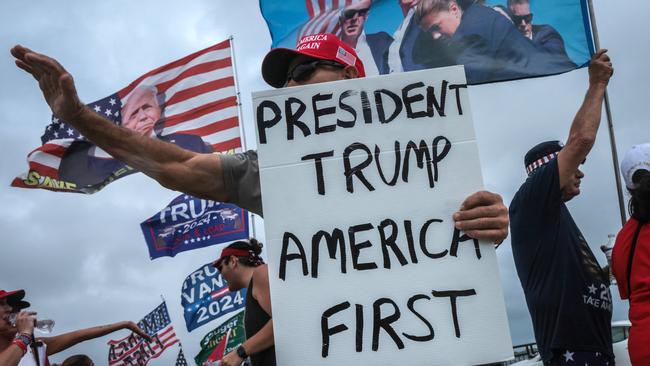
Meanwhile, fellow presidential hopeful Kamala Harris was keenly aware that the economy would have been what she would be judged on most. She was tipped to be likely to expand upon the protectionist policies of her current boss, President Joe Biden.
“The ‘America First’ trade policy has won a strategic victory over the past eight years, shifting the US bipartisan consensus towards the idea that globalisation was a lousy deal for Americans,” argues Australian National University analysts Peter Drysdale and Liam Gammon.
That puts Canberra in a difficult position.
How often will it be forced to choose between its closest strategic partner, the United States, and its major economic partner, China?
“We should tread carefully,” warns University of Adelaide Professor Peter Draper in The Conversation.
“Our situation remains hostage to Beijing’s relationship with Washington. Whether Australia’s trade woes with China are actually over may ultimately be out of our hands.”
Isolationism
“The steady progress made through agreements, including the Quad and AUKUS, is a testament to the region’s commitment to collaboration. However, the spectre of a Trump return threatens to derail these efforts, as his first term was marked by inconsistency, unpredictability, and contempt for multilateralism,” argues RMIT University professors Aiden Warren and Charles Hunt.
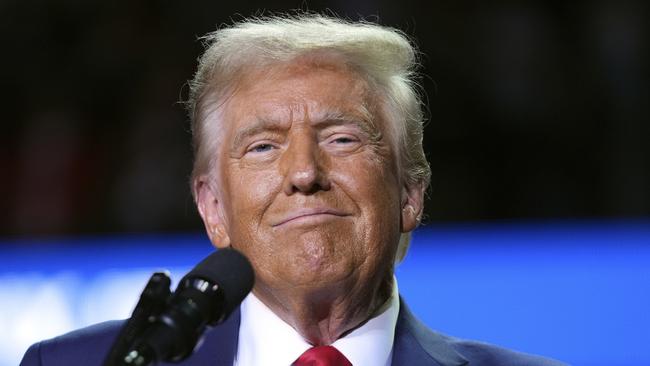
The Quad security and economic cooperative agreement between Australia, India, Japan and the United States has strengthened.
But the military technology sharing agreement between Australia, the United Kingdom and United States isn’t on such solid ground.
“Significant questions about the future of AUKUS – in particular the nuclear-powered submarine program – already exist, and Trump’s capricious approach to governance could further complicate the partnership,” the RMIT professors add.
The $A368 billion project is Australia’s largest-ever defence project. Its success is crucial for the economies of South Australia and Western Australia. And it’s a central plank in government policy to lift the nation out of the “dig it and ship it” age of iron ore exports into a new era of advanced manufacturing.
Its future, analysts argue, depends on whether or not Washington DC – under any president – sees value in the agreement for the United States.
“Trump, being a more transactional and unpredictable leader, at times praised or threatened traditional US allies, but overall, his administration not only left these alliances intact but, arguably, enhanced them as well,” argues RAND think-tank defence analyst Derek Grossman.
“The Biden administration sought to repair what damage was caused by Trump and to vigorously upgrade alliances and partnerships across the board to assist in great power competition against Beijing.”
Protectionism
Australia’s economy is in a precarious position regarding US-China relations.
“While China might trigger Australia’s strategic anxiety, there is widespread recognition that it remains Australia’s most important economic partner,” argues University of Technology Sydney Professor James Laurenceson.
“In the US, however, there is now bipartisan political consensus that China is an economic adversary.”
As president, Mr Trump bypassed World Trade Organisation rules and imposed protectionist tariffs on Chinese goods and restrictions on technology and cash transfers. During the 2024 campaign, he has announced he intends to increase that 19 per cent average tariff to 60 per cent.
This trade war has raised fears of supply-chain constraints of minerals and materials vital for modern electronics and batteries.
Initially, Canberra believed it could benefit from this polarisation of trade. But the Biden administration did not follow through.
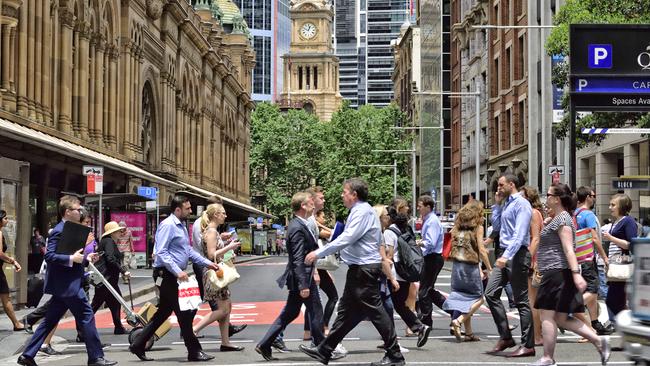
Instead, it maintained Mr Trump’s tariffs and added the $A650 billion Inflation Reduction Act. This substantially subsidises domestic supply chains for green technology – especially electric vehicles.
“Rather than using policy levers to drive ‘friend-shoring’ with Australia, Washington seems more intent on bringing supply chains onshore,” says Prof Laurenceson.
“Instead of relying on Australian supply, the Biden administration has been busy subsidising the development of lithium mines in Nevada.”
Meanwhile, Canberra has so far refused to follow Washington’s lead when it comes to imposing tariffs on heavily subsidised Chinese products, such as electric cars.
“If the US applies more tariffs in China, a larger volume of Chinese exports risk being dumped,” a Centre for European Policy Analysis report adds.
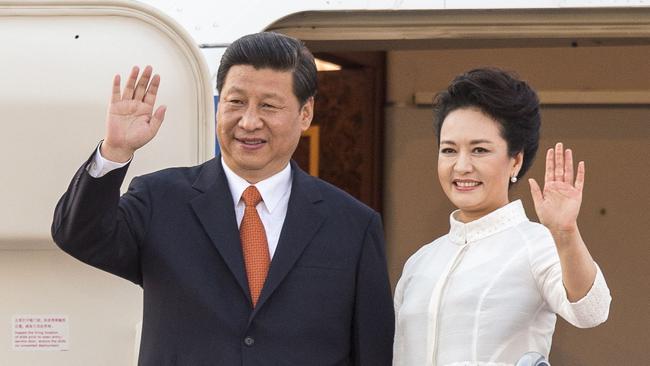
Exceptionalism
“The triumph of Donald Trump in the 2016 US presidential election fundamentally changed how the economic policy strategists in East Asia and the Pacific must think about the US role in the global trade regime,” the ANU’s Drysdale and Gammon state.
“They had to get used to the idea that the new regional economic order would have to be founded on the assumption that the United States will not be a partner in East Asian regionalism or show leadership on trade and global economic governance, for at least the next few presidential terms.”
The rules-based international trade environment established under the World Trade Organisation has proven to be a hurdle for US domestic politics. So Washington DC has ignored it.
At the heart of the trade agreement dispute is the 100 per cent tariff imposed by the US on Chinese electric vehicles and moves to diversify supply sources of critical minerals.
This has proven popular among voters.
“Harris and her party may be not as radicalised against the basic principles of economics as Trumpian Republicans,” the ANU researchers write.
“But with their focus on ‘middle-class economic diplomacy’, they have no intellectual counter-narrative about the way in which America’s slide into isolationism and protectionism will undermine its economic strength and political power.”
Canberra will come under pressure from the US to toe the line – and pressure from China to ignore it will be intense.
“This animosity is mirrored in Beijing,” adds Prof Draper.
“China’s security state is expanding ever more into business, while its private sector retreats.
“China’s own coercive activities are also escalating in regional disputes over the South and East China seas, as well as in its trade retaliations against Western markets.”
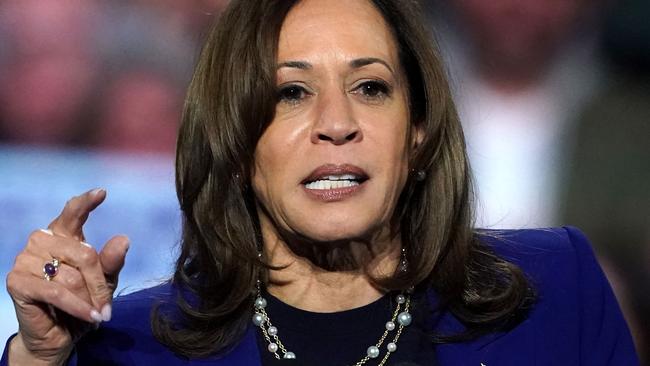
As a middle power, Canberra has neither the military weight to do without Washington DC nor the economic resilience to cope without Beijing.
“That means we must support the rules-based multilateral trading system – preserving the authority of institutions like the World Trade Organisation (WTO) – to constrain the actions of the great powers and preserve as much of our open trade posture as possible,” concludes Drysdale and Gammon.
Keeping friends close …
Both candidates came with clues from their past behaviour to indicate future directions.
“Australia thinks Kamala Harris and Donald Trump both offer versions of ‘more of the same’,” says Australian Strategic Policy Institute (ASPI) senior analyst Graeme Dobell.
“The Harris ‘same’ is a continuation of what the Biden presidency delivered – a substantial development of the alliance.
“The Trump ‘same’ is based on the success of the bilateral relationship during his presidency from 2017 to 2020, despite a dramatic early alarum (threatening call to arms).”
Analysts agree Australia’s economic future depends more on the fallout of White House policies – and the position it takes on them – than direct impacts.
“In recent years, protectionist sentiment has been rising within some Western countries, and the tendency for political interference in normal economic and trade activities has intensified,” the Chinese Communist Party voice, the People’s Daily, warns in a recent editorial about Australian trade.
“The erroneous policies of these countries have severely affected the positive momentum of economic and trade co-operation with China, resulting in a lose-lose outcome.”
Chinese punitive trade bans imposed on Australia during the Covid-19 pandemic have only been lifted in the past few months.
Now, Beijing is keen to remind Canberra of the cost of crossing its will.
“Hopefully, certain politicians in relevant countries who undermine economic and trade relations with China can seriously listen to the practical voices of their own business communities. They should recognise that their political interference will ultimately not only disrupt the overall trend of global trade co-operation, but also backfire on their own economies, leading to further isolation.”
Jamie Seidel is a freelance writer | @JamieSeidel
More Coverage
Originally published as ‘Increasingly unstable’: Expert claims Trump win would be ‘calamitous’ for Aussie economy





